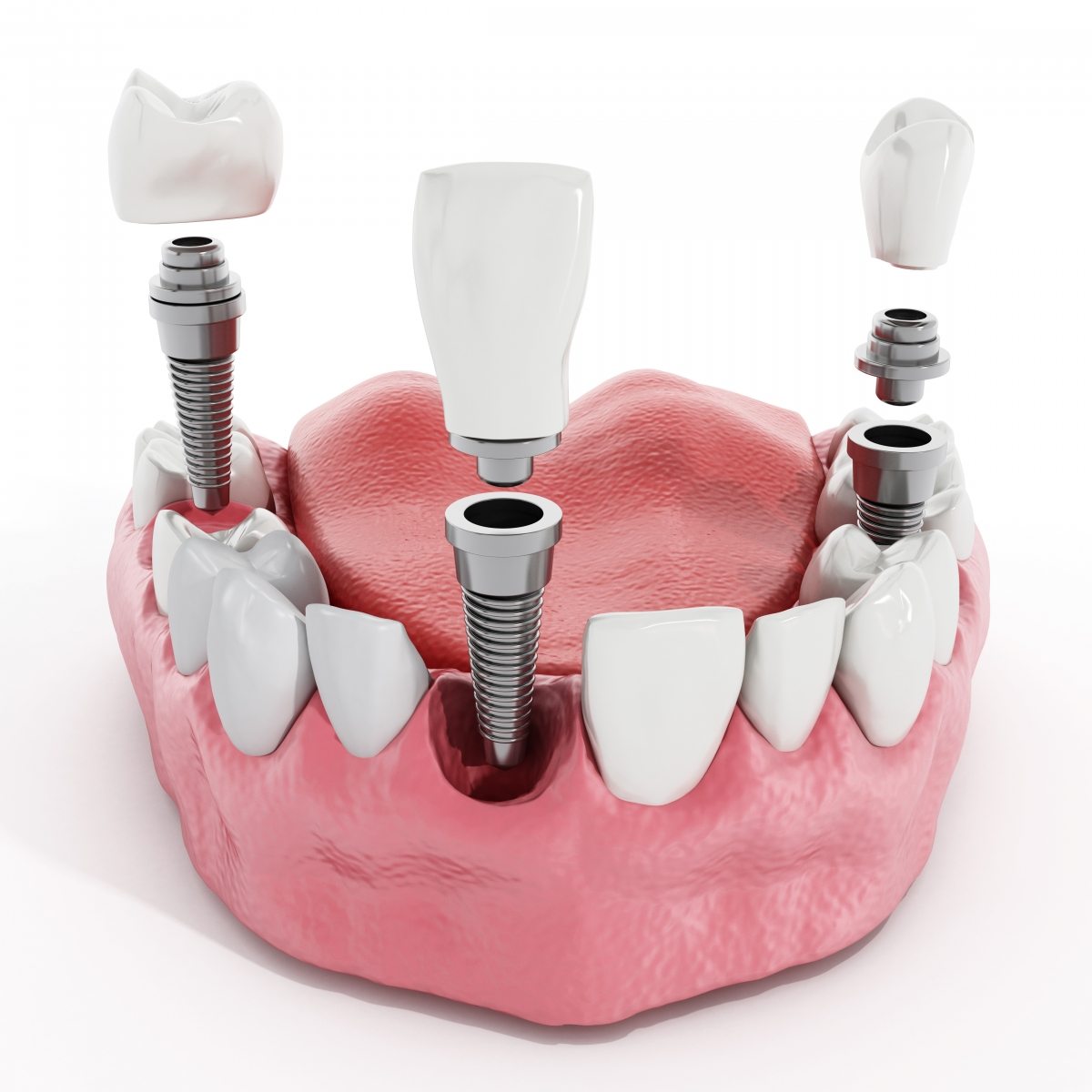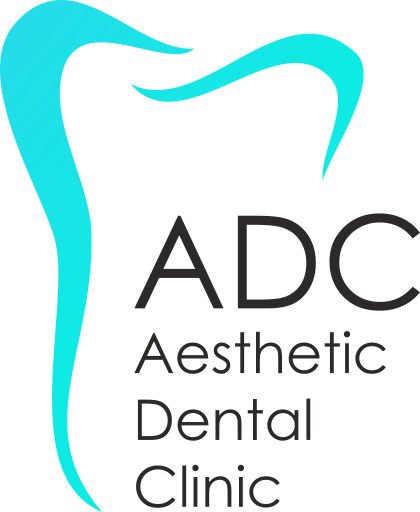Contents
Everything you need to know about dental implants
Everything you need to know about dental implants
The traditional method of replacing a tooth with a dental bridge has introduced several malfunctions, requiring new permanent solutions to the problem of missing teeth. One of the most important developments in modern dentistry is the permanent replacement of missing teeth with the use of dental implants. Modern dental implants are based on the phenomenon of being the god of integration, that is, the biological attachment of bone to the implant. A natural tooth consists of a crown, which is the part projecting, and its root, that is, the part that lies beneath the bone.
The dental implant serves as a replacement for the missing root portion of the tooth and provides retention and support to a permanently attached or removable prosthesis above it. The most suitable material for use in dental implants is pure titanium, but in recent years there have also been zirconia implants, as well as titanium and zirconia blend implants. For over 50 years, titanium has been used in the field of medicine for implants and technical joints. Titanium has many positive characteristics, most importantly its biocompatibility, that is, it is not rejected by the surrounding tissues. Other important advantages of titanium are:
- Allergy: Titanium is a clinically proven allergenic metal. Patients who have had allergies to various other minerals in the past have absolutely no problem with the use of titanium.
- Feeling hot / cold: Titanium is not a good conductor of heat. This means that it does not change the natural feeling of hot – cold.
- Natural Flavor: Titanium is tasteless and does not leave an unpleasant metallic taste in the mouth.
- Low specific gravity: Titanium is much lighter than all other metals that can be used in dentistry.
- High strength and high bonding: With coating materials e.g. ceramics, resins and other metals.
- Low cost
- X-ray permeability
Frequently Asked Questions About Dental Implants
What are dental implants?
Dental implants are a metallic imitation of the root of a tooth that has been lost or removed. Their material is made of pure titanium or zirconia or a mixture of titanium and zirconia (ROXOLID), and is placed inside the jaw bone. They are the most modern way of replacing one or more teeth.
What teeth are missing, so should the implants be placed?
Not of course, unless there is only one tooth missing, so there will be an implant. However, when three teeth are missing, only two implants can be inserted, and when four teeth are missing, only two implants can be inserted at the ends. When all teeth are missing, they enter the upper jaw of 4 – 6 implants and the lower jaw 4 – 5 implants to restore the entire dentition.
If one or all of the teeth are lost, then problems such as chewing, shouting, adjacent tooth problems, and often serious aesthetic problems occur when the front teeth are missing.
The result is that the person is ashamed to laugh, talk and thus become antisocial, his psychology is significantly affected, his self-esteem is falling and all this has a profound impact on his professional and social life.
In some cases an implant bracket and a natural tooth bracket are used. This is done in cases where you cannot have two implants for supports. It is a solution to the need. It’s called mixed support.
If all the teeth are lost and no dental implants are inserted but whole dentures, then the jaw bone continues to be absorbed and atrophied, and after several years without implants, the lower part of the face deteriorates and the person appears aging. So as an advantage, dental implants can also be said to hold the bone mass and so the bone does not absorbed.
Can a tooth be extracted and place a dental implant at the same time?
This can only be done in 10% of cases and if there are specific reasons for doing so. In the remaining 90% of the cases, the graft should be implanted in the wound after extraction, stitched, left for 4 to 6 weeks for healing, and a dental implant placed in the second phase. This method is the best scientifically documented.
Can only two implants be inserted in each jaw and one full denture (inserted total denture) over the implants?
In this case, when the dentures are removed, special connectors (LOCATORS or BALL ATTACHMENTS) are placed on the implants. These dentures that are fastened to implants are called total dentures and only the lower jaw needs two implants to be able to fasten. But for the upper jaw, four implants are needed. This is also the well-documented scientific method. The main total dentures have very good stability and hold and no special adhesives are required. They are easy to install and remove.
Is it possible for my body not to accept a dental implant?
Implants can be placed on those who are healthy and have enough bone mass. The materials used to make the implants nowadays are completely biocompatible with the tissues of the human body. They consist of pure titanium or zirconia or a mixture of titanium and zirconia. When integrated with the bone, they become part of it and are like a single body. This is called osteogenesis.
If the implant is lost until the first month of implantation, it is due to human error and not the implant material itself. Such mistakes are:
- Wrong patient means that he may not follow his dentist’s instructions, for example he may chew gum or feed on the newly implanted implant. He must be careful of the first time and do not constantly brush with his tongue, his food, but leave it quiet to osteoporosis.
- Mistake of the dentist who does not have the experience to properly place the implant or the knowledge needed in some difficult cases. Even in error in the initial design of the treatment to follow.
Are all people candidates for dental implants?
Implants can be placed on those who have good bone mass and are healthy. There are some categories of patients whose prognosis is not as good as very heavy smokers e.g. 20 cigarettes a day, in combination with advanced periodontitis. In this case they can of course be fitted, but usually the literature says that within five years they will lose, as did their teeth. In people under the age of 18 again, implants cannot be implanted because the development of the jaws is not fully complete and thus the implant will later appear shorter than the other teeth, as the remaining teeth grow and grow at the same time as the jaws. .
Implants are very important in people who have been traumatized by traffic accidents or neoplastic diseases. These individuals have a much better quality of life after implant placement.
The complete contraindication is:
- Bone diseases such as: Fibrous dysplasia, incomplete osteogenesis, multiple myeloma, Paget’s disease.
- Radiotherapy in the jaws. Implant loss below 30% in the lower jaw and over 40% in the upper jaw. The overall survival of implants in this case is 56.5% – 87.8%.
- Absolute contraindication if the patient develops a crisis in less than one month. If it has been controlled with medications and has not experienced a crisis in recent years then implants can be rehabilitated.
- Myocardial infarction or stroke. Absolute contraindication within the first six months of the event.
- Prosthetic valves. Absolute contraindication in the first six to 12 months.
- Unregulated Type II Diabetes Mellitus. When glycosylated hemoglobin is above 7, the rate of implant loss is 7.8%.
- Dry mouth. In these cases, it is better to insert complete dentures rather than permanently adhering the screw implants. The reason is the best oral hygiene.
- Paralytic joints and roar. Some patients overnight tighten or brush their teeth or even bite them. As a result, the implants receive excessive force and the restorations on them become worn out and even destroyed. In these cases, a splint may be given after the end of the work, which the patient must wear every night.
- At an advanced stage of the disease there is a decrease in bone density and bone mass. Implant therapy is contraindicated.
- In chronic osteomyelitis it is contraindicated. Acute osteomyelitis can be treated after complete cure.
- Chronic kidney failure. The placement of implants due to uncertain prognosis is contraindicated.
- Platelet disorders. Such as leukopenia and severe forms of anemia, haemophilia and agranulocytosis.
- Patients after organ transplantation. It is contraindicated in the first 3 to 6 months after transplantation.
- During pregnancy. The operation for implants is completely contraindicated. Radiographs and medicines can be given after pregnancy.
- It is not a complete contraindication, but it is necessary for the surgeon to assess the quality and quantity of cortical and spongy bone.
- In people with impaired mental health and drug use, as well as alcoholics, it is advisable to avoid dental implant treatment.
- Patients with genetic diseases and diseases of the immune system and autoimmune diseases.
- Other diseases such as chronic leukemia, Parkinson’s disease, scleroderma, common pemphigus, ectopic dysplasia, Sjogren’s syndrome, AIDS patients, cancer in treatment.
- Taking drugs, such as taking bisphosphonates for over two years, long-term corticosteroids, and chemotherapeutic drugs.
How Much Does a Dental Implant Cost?
Implants are a state-of-the-art high-tech construction and the cost is different depending on the case. The final cost will depend on the number, the type of implants, their placement process, and the type of overhead work. Implantation represents a completely unique and personalized treatment for each patient individually. They improve the quality of human life due to better aesthetics, chewing and vocalization, which cannot be costed. In the long run, however, dental implant treatment is more cost-effective than other restorative methods, because implantation work can take many years and often requires no replacement. Finally, dental implants are an investment that one can make to improve their quality of life. There are also many treatment plans and many payment methods e.g. credit card, bill, loan and other ways. Moreover, in almost all cases, a few months elapse between implant placement and final restoration. So the amount is divided by the months of waiting.
The quality-to-cost ratio is now in favor of patients, as there are modern companies manufacturing top quality implants in line with new design and biology concepts. This gives the possibility of aesthetic restorations with excellent prognosis and costs much more accessible than in the past.
How long do dental implants have?
Replacing natural teeth with dental implants is a permanent solution and studies have shown that the success rate and survival of their 10 years of operation in the oral cavity is 95 – 97%, as long as the patient performs excellent oral hygiene and recheck at the dentist every six months, as with natural teeth. The survival rate of prosthetic implants, which we see in the mouth, is 95% in the decade. According to current scientific data, the success of implants in the front of the upper jaw is 90% – 95%, while in the back of the upper and lower jaw is 85% – 95%. At the front of the lower jaw this success rate reaches 98% – 100%. There is no expiry date on the implants, nor can it be accurately predicted how long they will remain in the mouth, because there are many irregular factors, such as excellent oral hygiene, smoking, the patient’s overall physical health, which can vary with the patient. Over time, visits to the dentist every six months, periodontal disease and more. Thus, all the doctor can say after scientifically documented studies is that there is no specific time (expiry date) for the implants to remain in the mouth.
Will I be able to eat normally during the time that the implants are osteogenic?
Yes. You can eat whatever you want. For a short period of time after their placement, the diet should be slightly soft. As time passes and the time for final restoration approaches, so will the diet as it was before.
Will I be able to have a temporary prosthesis during the healing period and until a final job is put in my mouth?
Yes. In almost all cases a temporary transitional job can be assigned. But each case is different. Nowadays, even with the technology available, a temporary restoration can be made directly after implant placement, and in very few and urgent cases even the final restoration.
Is implant placement a common surgical procedure?
Yes. This surgical procedure has been applied since 1969 to tens of millions of patients worldwide.
Can anyone understand that I have implants in my mouth?
With the technology available today, you will not realize that you have implants.
With proper 3D implant placement and good prosthetic restoration, implants today can be even more aesthetic than your natural teeth.
Is the whole process painless as well as the subsequent days of healing?
Yes. It is more painless and more traumatic even than a simple tooth extraction. The whole procedure is performed with local anesthesia in the dental clinic, giving the doctor the appropriate medication both preoperatively and postoperatively.
Will my face be swollen (edema)?
Usually a small edema exists, but it also depends from the response of each individual. The doctor will prescribe the appropriate medication preoperatively and there will be no edema. After surgery the patient will only put some ice for the first few hours.
Who should I contact when I want to have dental implants?
We should always consult your general family dentist. For any problem that we face in our oral cavity we first visit our dentist and he will diagnose and come up with the treatment plan he needs or will refer us to a more specialized one if needed.
Why put an implant or implants and not a dental bridge?
If the adjacent teeth are not in good condition, that is, they are dull, already grinded or have huge seals, then it is best to get a classic bridge, as this will protect them. But if the adjacent teeth are healthy, then it would be inappropriate to grind and remove healthy dental tissue, as this will result in some sensitivity, even some loss of these teeth in the future.
Also when all teeth are missing, then it is best to have dental implants because you avoid the volume and mobility of the whole denture, which can cause minor injuries and difficulties in chewing and talking. So you have a better aesthetic, comfort in chewing and shouting, as if it were your own teeth.
Finally, with dental implants you achieve tumor preservation and avoid jaw bone atrophy. Thus the face does not look aging and unattractive, which happens when the human teeth are missing.
Are there different types of implants and qualities?
Of course there are a few hundred types and qualities of implants from different countries of origin. Not all are the same. The top 10-15 companies in the world market are the ones with the largest literature and the best scientific documentation. They have been around for many years and the most important is that you can find accessories and get good service after many years.
The dentist has done the research for you, monitors the developments in the field of dental implantology and knows better what is appropriate for each individual case. Trust him!
How many stages are there from the beginning to the end of the implant placement process?
It is a simple and easy process consisting of 4 steps.
Stage one: incident planning and implant placement.
Stage Two: Osteointegration period of 4 – 8 weeks
Stage Three: 2 – 3 weeks final restoration
Stage Four: Outcome Maintenance and Six-Month Dental Checkup.
What care do dental implants need after implantation?
The treatment is the same as with natural teeth. That is:
- Brushing right and everyday
- Dental floss and interdental brush
- Oral solution, and
- Every six months visit the dentist.
All of these are aimed at removing the dental microbial plaque over the implants and prosthetic restorations, and preventing gum inflammation resulting in the development of peri-implantitis. Peri-implantitis is similar to periodontitis around the teeth, resulting in the loss of bone around implants.
What are the advantages of dental implants?
- They improve speech.
- They improve the chewing. They improve the aesthetics of the face.
- They improve oral hygiene.
- They improve the quality of life in elderly people, in amputated jaws following neoplastic diseases or in traffic accidents.
- Their survival in the mouth lasts for many years, sometimes for the whole of human life.
- They raise patients’ self-esteem.
- You do not need to destroy any healthy teeth to restore the aesthetics, chewing and speech of the patient resulting in medium and long term tooth loss problems.
Will I be given a certificate at the end telling me what kind of implant I have in my mouth?
Of course, the dentist must also give you a certificate. In this case, all implant companies give some kind of identity. The dentist peels the sticker over the vial in which the implant is located and will place it on this ID along with some of his own notes. So the patient has his own identity and knows exactly the type, company, length, diameter and even the barcode of the particular implant.

What conditions must be met for implantation
Several millions of people around the world are already able to show us the benefits of a dental implant restoration. Scientific documentation and acceptance of implants is constantly increasing worldwide, recognizing it as a more advantageous solution than several conventional restorative methods. With the proper care that natural teeth require, implants will serve you aesthetically and functionally for many years.
Gaining a quality of life is very important
- Provided that the human body has reached the age of 18 and fulfills all the requirements for good general health (e.g. no abnormal diabetes mellitus, AIDS, other diseases or no radiation at that time in the region of the head), then any gap between missing teeth can be closed using implants.
- A basic prerequisite for implantation is to have proper bone quality and quantity.
This can be decided by your dentist after special radiological and other special tests.
- The implants have been used for more than 45 years on a scientific basis and throughout this period are subject to the most rigorous testing in the research, development, manufacturing and disposal phases. So it is a scientifically proven method that means system reliability. Implants are manufactured:
- Of pure titanium
- In recent years some companies have made them from zirconia for anterior primary teeth and cosmetic purposes, and
- From titanium-zirconia blend and called Roxolid, for greater fracture resistance.
Any material from the three preceding categories is incorporated into the oral tissues without complications, allergic reactions or rejection. Studies have shown that the probability of an implant not being osteointegrated is only 3% – 5%.
- Before implantation, it is necessary to restore the health of the teeth, gums and the oral cavity in general.
After implantation, however, the continued maintenance of excellent oral hygiene with special yarns, solutions, gels, interdental brushes and whatever else the dentist recommends, such as regular patient checkups, provide the necessary guarantees for their long-term stay.
- No matter how well-meaning the patient is, he should not interfere in technical and medical matters that he is not aware of. Again with aesthetic considerations, he should not intervene when this intervention is detrimental to the health, function and longevity of the implants in the mouth, as well as the general health of his body.
- The length of time, from the start of implant placement to final restoration, varies depending on the general health of the patient, the type of implant and the type of prosthetic rehabilitation. It usually takes 6-8 weeks for the implant to be implanted with an SLA surface. But sometimes it takes up to 12 weeks depending on the bone quality and the type of implant. In the interim, the dentist will try to restore the aesthetic of the patient, with a temporary prosthetic work, as long as permitted in terms of hygiene and functionality of the implant and oral health. In 2006, the Swiss company Straumann launched a new type of Slactive implant, which is being integrated in just three weeks. So after the 6-8 week or 3 week period for the new type of implant, another 2 – 3 weeks are still needed until the end of prosthetic work, depending on the type. If osteointegration problems arise due to bone quality or the addition of implant material, then this time may vary accordingly.
- There is no expiration date for the implants, nor can they accurately predict the amount of time they will remain in the mouth. There are many irregularities such as excellent oral hygiene, smoking, general physical health of the patient, which can change over time, visits to the dental clinic every 6 months, periodontitis etc. So it can only the doctor says after scientifically proven studies there is no specific time for the implants to remain in the mouth. Studies have shown that the success and survival rate of implants is 95% – 97% for 10 years in the mouth, provided the patient performs excellent oral hygiene and six-month re-testing.
- There may be some problems with the operation of implants and supernatural construction over time such as:
- Fracture a screw or loosen and unscrew it.
- Dip a live tooth when it is attached to an implant at 3.5% (References).
- Some fracture and deterioration of the supernatant prosthetic structure.
It is possible that the manufacturer of these implants after many years has no spare parts for some types of implants.
For this and for other unforeseen events that may occur, the physician is not responsible and the repair costs are entirely borne by the patient after one year has elapsed since their placement.
- After 6 – 8 months after inserting whole dentures, it is usually necessary to refill them.
This is a costly burden for the patient.
- Implantation is a high-tech construction and the cost is different and case-by-case. The final cost will depend on the number, the type of implants, their placement process, and the type of overhead work. The money should be paid in the following way:
– 1/3 of the value of the money agreed upon signing this contract.
– The other 1/3 with the stitches cut by the dentist or surgeon.
– And the last 1/3 with the end of prosthetic work.
- Implantation represents a completely unique and personalized treatment for each patient individually.
Designed and implemented by the dentist, his dentist and the maxillofacial surgeon, according to the specific requirements per incident. This fact does not allow for a rough estimate of both the time and the cost of such high-tech, complexity and precision treatment, involving two doctors and a specialized dental technician. Talking to your dentist is the best source of information for your treatment plan and may be of concern to you.



